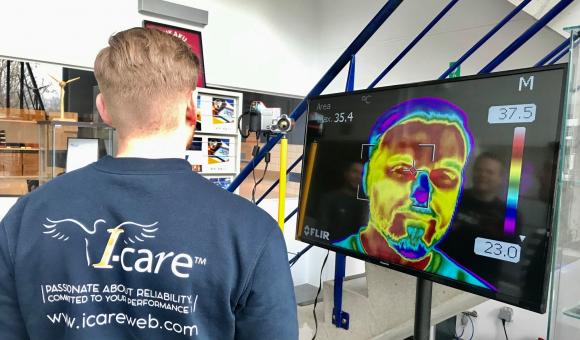
Mons-based company I-care, a leader in industrial predictive maintenance, came up with the idea of converting a thermal measuring device intended to detect machine breakdowns, into an infrared thermometer able to measure body temperature automatically and without contact. As lockdown restrictions start to be lifted, this is a particularly useful device for avoiding the spreading of the virus in work environments.
Located in the Parc Initialis in Mons, I-care develops sensors that, when placed on industrial machines, analyse their vibrations, their temperature, and the state of their oil, making it possible to detect any future technical problems and to replace any worn parts before the breakdown occurs.
Fabrice Henrion, CEO of I-care, was in Italy on 21 February and very soon became aware of COVID-19. When he returned to Belgium a few days later, he took very strict precautionary measures for his business. This was when "an engineer had the idea of installing a camera at the entrance to buildings to monitor the temperature of employees," he explained to L'Echo. The solution soon became operational. "Instead of picking up visible light, these cameras pick up infrared rays, which are given off by the body as soon as their temperature is above 0°," he explained to RTBF. "You can see yourself on the screen, but in different colours that reveal the different temperature zones on your face. The camera detects the highest temperature in its field of vision and displays the temperature on the screen."
Each employee can then instantly see whether or not they have a temperature and return home if they do. This precautionary principle was obviously of interest to a number of sectors, from heavy industry to SMEs, hospitals, care homes, banks, office blocks and even airlines, so they could equip their planes and thus protect their employees and/or clients.
However, I-care was concerned about confidentiality. "In order to comply with GDPR, we decided not to save the image, although this could be done," stated Fabrice Henrion. "We just take the temperature live."
The Mons company sold several hundred cameras in April alone, compared with around 30 for the whole of 2019. Given this success, which should increase with the current easing of lockdown restrictions, I-care, which assembles the cameras before marketing them, will soon start to cover the entire manufacturing process.
I-care, based in Mons, has 450 employees and several production sites in Belgium (Gosselies, Huy, Heverlee, Kontich), as well as in Europe, the USA, South Korea and Australia.